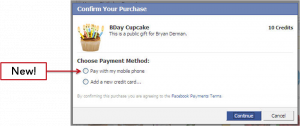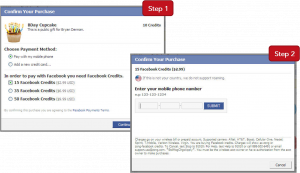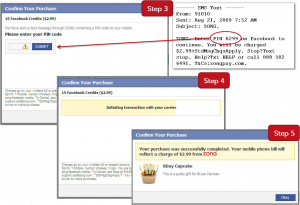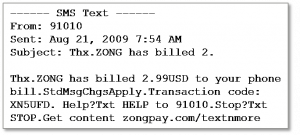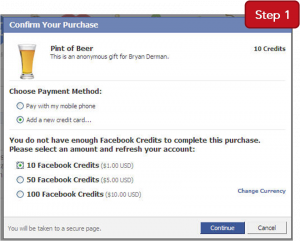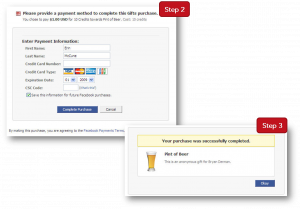At Glenbrook we believe that social eCommerce and virtual currencies are the new frontier of payments. Person-to-person transfers, charity donations, and micropayments for virtual goods (e.g. games, music, e-books, etc.) are exploding within social networks and as the 800-pound-gorilla in the social networking space, all eyes are on Facebook. Estimates vary, but $300-500 million in transactions may happen within Facebook in 2009 (note 1), although thus far precious few of those transactions are funded by a native Facebook payment mechanism.
A couple days ago I decided to send my colleague Bryan a birthday gift on Facebook and was startled to discover that Facebook now as an option to buy Facebook Credits, Facebook’s fledgling virtual currency, via mobile phone using Zong (more from Payments Views on Zong here). Developers on Facebook have accepted mobile payments for some time now, from Zong as well as other mobile payment providers, but the Facebook Gift Shop and Facebook Credits are Facebook services, not a developer product. And up until now (note 2) Facebook has only accepted credit card payments.
Being the payment geek that I am, I opted for the mobile phone payment option and took screen prints of the process flow. And then I wanted to compare the check out process via phone to the credit card check out process, so I bought Bryan a second gift (lucky Bryan) and took more screen prints. Continue reading to see a comparison of the check out process for the two payment methods.
But first, a little background…
The (Continuing) Evolution of Facebook Payments
- There has been a long standing Facebook Gift Shop where users can purchase virtual gifts for one another for $1 each. (Some sponsored gifts are free.) Users purchase “gifts” with a credit card: MasterCard, Visa, AmEx.
- December 2007: Rumored that beta test of payments system for applications was imminent. Developers were instructed to sign up to participate (and had to sign an NDA).
- November 2008: Converted gift shop dollars to “credits.” Each $1 buys 100 credits, so gifts that used to cost $1 are now priced at 100 credits. Still pay for Facebook Credits with a credit card.
- March 2009: Facebook claims to be “looking at” a virtual currency system.
- April 2009: Facebook introduces a limited pilot program whereby users can give credit to one another. If one user “likes” content that one of their friends has posted, the user can give them a virtual tip, using Facebook Credits. The only thing you can do with the credits is buy Gifts or give them to your other friends.
- May 2009: Facebook announces “Pay With Facebook” a new feature that will enable users to make purchases from Facebook application developers. Funding is via Facebook Credits, which can be purchased only via credit card.
- June 2009: Facebook began testing payment for virtual goods within Facebook using Pay With Facebooka nd Facebook Credits, starting with the GroupCard, Birthday Calendar, and MouseHunt applications.
- August 2009: Facebook announces that the Gift Store is conducting an “alpha test” of non-Facebook gifts in the Facebook Gift Shop, including some physical goods (e.g. flowers, candy).
- August 2009: It is now possible to purchase Facebook Credits with your mobile phone, via Zong.
Purchasing Facebook Credits via Mobile Phone
(Note: click on individual images to see larger version)
When I clicked on Bryan’s Facebook profile I was reminded to wish him Happy Birthday, and optionally, buy him a “gift”
Up until now, Facebook has only accepted payment via Credit Card for Gift Credits. But now it is possible to pay with your mobile phone. Note that the “pay with mobile” option is listed first.
I could select whether to purchase 15 ($2.99), 25 ($6.99), or 50 ($9.99) Facebook Credits and then prompted to enter my mobile phone number.
Meanwhile, I received a SMS text message from Zong providing a PIN number, confirming a payment of $2.99 to Facebook, and instructions on how to stop the payment or get help:
I entered the PIN number provided, waited a few moments, and then got a confirmation screen.
Finally, I received two confirmation SMS text messages from Zong (not from Facebook):
Purchasing Facebook Credits with a Credit Card
For Bryan’s second gift (a virtual beer, I am sure he would have preferred a real one!) I opted to pay with a credit card. Note the difference in price per Facebook Credit (more on that in a minute).
Next I entered my card details and was immediately presented with a confirmation screen. The process is definitely quicker (and cheaper) if you purchase via credit card.
Finally, when I purchased via credit card I received a confirmation email directly from Facebook (whereas with the mobile phone payment I received the confirmation via SMS text from Zong, rather than Facebook).
Pricing Varies by Payment Method
When I paid with my mobile phone the price per Facebook Credit was twenty cents. I only paid ten cents per Facebook Credit when I made my purchase with a credit card. Zong charges the merchant (in this case Facebook) a higher processing fee than the credit card companies do. This is not uncommon. Payments via mobile phone are typically for virtual goods (ring tones, avatar super powers, games, etc.) with relatively low cost of goods, thus merchants are less price sensitive. Once they’ve done the coding, every incremental sale above and beyond development costs is profit. Mobile payments for virtual goods cost between 20-50% of the transaction amount, with most of the fee being passed on to mobile phone carriers. Given this pricing structure, it is not surprising that Facebook charges more per Facebook Credit when you buy with your mobile phone. It is unclear how much of the net fee application developers receive and how much Facebook retains, and if the split varies depending on payment method.
Other Forms of Payment Within Facebook
Keep in mind that Facebook Credits are just one way of purchasing goods within Facebook. Today, Facebook application developers monetize their games and other applications by accepting payment directly using PayPal, Google, Amazon FPS, or SocialGold. Or developers may opt to receive direct payment via mobile phone via Zong, Boku, or another mobile payment provider. Virtual currencies that can be used across a variety of social networks and game sites include Spare Change and SocialGold. It is also possible to earn virtual currency credit by taking surveys and participating in trials offered via Super Rewards, OfferPal Media, Peanut Labs and many others. And finally, game developers in particular, often accept payment via a prepaid card sold in retail establishments, such as the Ultimate Game Card. The social and gaming web is exploding with virtual currency offerings, yet thus far no one model or payment brand dominates.
We’ll continue to monitor Facebook’s payment evolution and track the development of social eCommerce here at Payments Views. In the meantime, you might enjoy these related Payments Views posts:
- Digital Content & Mobile Phones – a Look at Zong by Carol Coye Benson (July 15, 2009)
- Payments Views Archive: Mobile Banking & Payments
- Payments Views Archive: Facebook
Notes
- Facebook transaction value estimates here.
- Caveat: I am not quite sure when Facebook started accepting Zong – sometime after June, as that was when I last checked in. I suspect, but haven’t confirmed, that the change was made in conjunction with last week’s announcement that the Gift Store is conducting an “alpha test” of non-Facebook gifts in the Facebook Gift Shop, including some physical goods (e.g. flowers, candy). If anyone out there knows for sure, please let us know in the comments.


